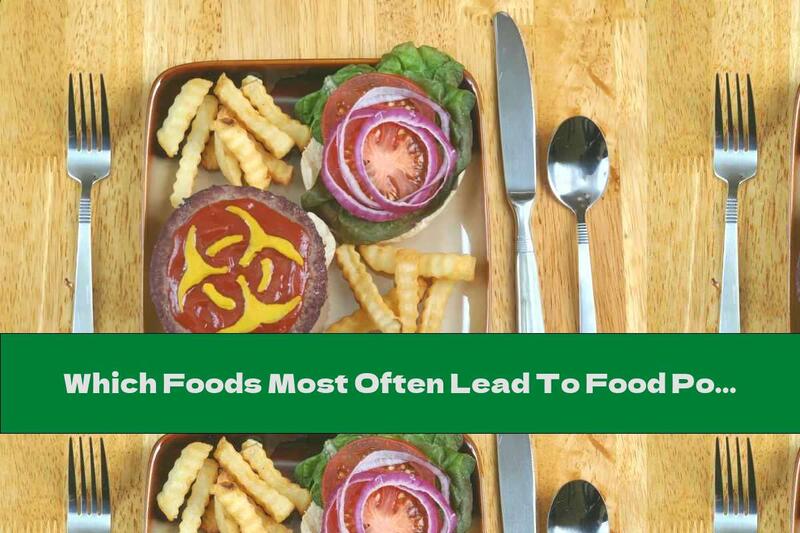Which Foods Most Often Lead To Food Poisoning?
 Author: Leticia Celentano
Time for reading: ~2
minutes
Last Updated:
August 08, 2022
Author: Leticia Celentano
Time for reading: ~2
minutes
Last Updated:
August 08, 2022

In this article, learn more about Which Foods Most Often Lead To Food Poisoning?. Bacteria or their toxins in these foods cause 80% of cases of food poisoning..
Food poisoning occurs when we consume food contaminated with dangerous bacteria and viruses or their toxins . Depending on the concentration of these products in the food, poisoning can occur within hours or several days after consumption. The most common symptoms of food poisoning are severe abdominal pain, vomiting, diarrhea and loss of appetite.
Due to the very suitable environment for the development of pathogenic microorganisms that they provide, several types of food are listed as the most dangerous for causing food poisoning. It has been found that the consumption of these foods is the basis of most cases of food poisoning . The risk increases in conditions of higher ambient temperatures and improper storage of these foods.
Chicken meat
The high risk of food poisoning after eating chicken meat comes from the high frequency with which this type of food is found bacteria of the genera Campylobacter and Salmonella . They inhabit mainly the intestinal tract of birds and the areas of their plumage. From there, they can very easily pass into the meat when processing poultry products in non-sterile conditions. Studies show that between 40% and 80% of the raw chicken products on the market are contaminated with these bacteria and only good heat treatment can guarantee their destruction.
Green leafy vegetables
The close contact of these products with the soil with potentially polluted waters during their cultivation is a prerequisite for their very easy infection with various bacteria. An additional risk is their usual consumption in raw form. Vegetables are the most common cause of food poisoning in the spring, due to the development on them of bacteria of the genus Salmonella , Listeria and especially those of the species Escherichia coli . To reduce the risk of food poisoning, it is mandatory to eat vegetables well washed and soon after the preparation of the salad, to prevent the rapid growth of colonies of bacteria that may have fallen on them.
Fish and fish products
If not stored at a sufficiently low temperature, this type of food is the main reason for the so-called. scombroid poisoning . It is provoked by the increased content of histamine in fish products, which is not destroyed by heat treatment and triggers a powerful allergic reaction with pronounced gastrointestinal symptoms - nausea, vomiting, disorder. In addition to histamine, a number of other bioactive toxins can accumulate in fish products when stored improperly and trigger dangerous food poisoning.
When the risk comes from the potential contamination of food with bacteria or other microorganisms, good heat treatment is the only guarantee to prevent food poisoning. However, it is clear that some toxins in food are thermostable and remain in them even after cooking. Therefore, storing food at a low temperature in the refrigerator is also mandatory as a preventive measure against food poisoning.
Related Articles
- Nutrition for Respiratory Health: Supporting Your Lungs with the Right Foods
- The Ultimate Guide to High Gluten Foods: Benefits, Sources, and Recipes
- The Ultimate Guide to High Gluten Foods: Effects, Benefits, and Recipes
- The Ultimate Guide to Lactic Acid in Nutrition: Benefits, Food Sources, and Recipes
- The Nutritious World of Wendy's Salads: A Healthy Fast Food Option
Top Nutrition Articles Today
- . Understanding Food Labels: A Guide to Reading and Interpreti...
- . The Ultimate Guide to Diet Powerade: Benefits, Flavors, and...
- . The Ultimate Guide to Gatorade in Nutrition: Benefits, Usage...
- . The Power of Beans: Nutritional Benefits and Delicious Recip...
- . The Nutritional Benefits of Quail: A Protein-Rich Bird for a...
- . The Essential Guide to Nutrients in Nutrition: Importance an...
- . Chicory: 15 Health Benefits, How To Drink, Contraindications...
- . The Science of Raising Agents in Baking: Chemical and Functi...
- . List of Foods that Contain Carrageenan: A Guide to Avoiding...
- . Hydrochloric Acid in Digestion: Importance, Symptoms, and Na...